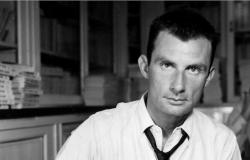Reading time: 4 minutes
“I’m not psychologically ready for the bakery,” says a distraught Vincent Macaigne in Out of time. The actor plays Paul, the fictional double of filmmaker Olivier Assayas, confined in the middle of Covid with his brother in their childhood home.
Faced with the uncertainty of the pandemic, the protagonist manages his anxieties in a way that may seem familiar to you: by leaving the groceries outside for twenty-four hours, by consulting the interactive map of the number of daily cases, or even by buying socks he doesn’t need on Amazon.
Of Kimi (Steven Soderbergh) Bad Luck Banging or Looney Porn (Radu Jude) through the excellent horror film Host (Rob Savage), which takes place entirely on Zoom, several film projects have attempted to tackle the Covid theme, starting in 2020. But few of them succeed in capturing the specific mood of this period, as well in its humorous and existential dimension.
In theaters since June 19, Olivier Assayas’ new film is undoubtedly the one that best manages to transcribe the strangeness of these few weeks of spring 2020 – the logistical absurdity, the contemplative rhythm, but also the neuroses, the arguments and deep questions that the pandemic has provoked.
Experimental film
If Out of time also rings true, it is undoubtedly because Olivier Assayas wrote it during confinement, while he was, like the characters in the film, isolated with his brother in the old family home. For this project conceived as an experimental story, mixing fictional comedy and elegiac autobiography, the director chose to film in his real country house. “I have practiced a cinema that has always been in one way or another autobiographical, and I was confronted with the reality of this problem by confining myself in this house. I told myself that I had to be accountable, including in relation to the films I made before, he analyzes. I told myself ‘if I make this film, I’m not going to cheat’.”
Despite everything, the filmmaker hesitated for a long time to bring this very personal project to the screen. After writing, the film underwent a long gestation period, three years during which Olivier Assayas was monopolized by his series. Irma Vep (HBO). “In the meantime, I have gone through all the colors of the rainbow, he explains. There were times when I said to myself “this is interesting, it’s worth it”, other times I said to myself “but no, I’m not going to shoot in my house, what a horror, and then who wanted to hear about confinement”… And then I ended up taking the plunge.”
This distance was undoubtedly beneficial. Hand-washing tutorials, abuse of hydroalcoholic gel, remote psychology sessions and compulsive purchases… Out of time captures with striking accuracy all these little details which characterized the period of confinement – and sketches them with a finely measured comic perspective. “If I had written it last year, or six months before shooting it, there wouldn’t have been these kinds of oddities, bugs, which are specific to that moment. The fact of having written it during confinement meant that I grasped things that I had forgotten.
Watching the film, we remember our own whims and rituals, developed during confinement as so many psychological defense mechanisms. For some, it was sourdough bread, for others, video games. For Paul in the film, it is the purchase of a new saucepan that will meet a tragic fate. His brother, Étienne (Micha Lescot), develops a rigid culinary routine based on pancakes, whose therapeutic role we gradually guess. “I didn’t invent them, they were my brother’s pancakes, laughs Olivier Assayas. I think for him it was a ritual. For me it wasn’t of a culinary nature, strangely: it was the fact of running that soothed me.”
Therapeutic film?
Certainly, the experience of bourgeois, relatively comfortable and bucolic confinement transcribed in Out of time is not universal. But the filmmaker fully assumes the specificity of his story. “Whatever we do that has a certain value, we only speak well of what we know. And the question, ultimately, is how to be honest with that. I didn’t purposely be who I am. I am what I am and I represent in the most honest way possible what I experienced, I don’t cheat with that. Afterwards, we take it or we don’t take it.”
Sometimes light, sometimes melancholic, the film does not forget the heavy psychological dimension of confinement, which was for many a moment of painful and anxiety-provoking loss. Stuck in a house belonging to a bygone era, the characters are haunted by absence, death, the passage of time, without ever confronting it directly. Allusions to deceased loved ones are frequent, and when Étienne (inspired by Michka Assayas) suggests paying tribute to the Covid dead in his radio show, the producer warns him: “Be careful that it doesn’t look too necro.” “Autobiography, whatever it may be, awakens demons, and that may be why I wanted to make this film on the comedy register, because otherwise it was too complicated to Me. It would probably have been too dark, especially taking place in the context of the pandemic: no matter how smart we are and how much we laugh, people were dying.”
Will the introspective feature film offer the beginnings of catharsis to all those traumatized by confinement? For the public, perhaps. For Olivier Assayas, it’s a different story: “I don’t think films are therapeutic. I think the opposite actually. They are a way of reliving things, especially in the autobiographical form, which can be in a gray area between the painful and the cruel. […] While filming at home, I film objects that don’t mean anything to anyone, but which make my stomach knot when I look at them.”
Thus, more than a “containment film” (now a cinematic subgenre in its own right), Out of time is also akin to a film of mourning: of the “world before”, past loves or even childhood. “It was part of the project at one point, laughs Olivier Assayas, I told myself that I was going to get rid of the burden of my relationship with the past. In a way, my brother and I never dared to touch this house, because it’s what remained intact from our parents. I hoped that making this film would soothe my grieving relationship with this house. Is this what happened? I do not believe. But I feel like I did something with it, and because of that, maybe I’m a little bit more comfortable when I go there.”






